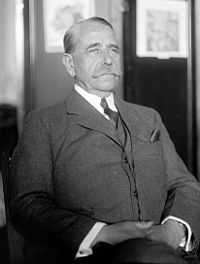George Scott Graham
George Scott Graham (born September 13, 1850 in Philadelphia , Pennsylvania , † July 4, 1931 in Islip , New York ) was an American politician . Between 1913 and 1931 he represented the state of Pennsylvania in the US House of Representatives .
Career
George Graham attended public schools in his home country. At times he was also given private lessons. After a subsequent law degree at the University of Pennsylvania and his admission as a lawyer in 1871, he began to work in Philadelphia in this profession. At the same time he embarked on a political career as a member of the Republican Party . Between 1877 and 1880 he was a member of the Philadelphia City Council. Between 1880 and 1899 he was a district attorney in Philadelphia County . He then practiced as a lawyer again in Philadelphia and New York City . From 1887 to 1898, in addition to his work as a prosecutor, he was also professor of criminal law at the University of Philadelphia. In 1892 and 1924 he participated as a delegate at the respective Republican National Conventions .
In the 1912 congressional election , Graham was elected to the US House of Representatives in Washington, DC in the second constituency of Pennsylvania , where he succeeded William S. Reyburn on March 4, 1913 . After nine re-elections, he could remain in Congress until his death on July 4, 1931 . From 1923 he was chairman of the judiciary committee . During his time as a congressman, the First World War and the beginning of the Great Depression in 1929 fell among other things. The 16th , 17th , 18th and 19th amendments to the Constitution were also ratified.
George Graham was buried in Woodlawn Cemetery , New York City.
Web links
- George Scott Graham in the Biographical Directory of the United States Congress (English)
- George Scott Graham in the database of Find a Grave (English)
| predecessor | Office | successor |
|---|---|---|
| William S. Reyburn |
United States House of Representatives for Pennsylvania (2nd constituency) March 4, 1913 - July 4, 1931 |
Edward L. Stokes |
| personal data | |
|---|---|
| SURNAME | Graham, George Scott |
| BRIEF DESCRIPTION | American politician |
| DATE OF BIRTH | September 13, 1850 |
| PLACE OF BIRTH | Philadelphia , Pennsylvania |
| DATE OF DEATH | 4th July 1931 |
| Place of death | Islip , New York |
